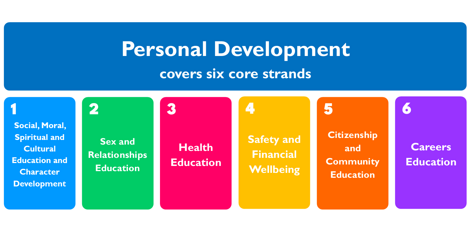Personal Development Curriculum
Personal Development Curriculum
SMSC and PD integration is an integral part of our educational approach, seamlessly woven into our curriculum. Our dedicated teaching staff actively strategise to create opportunities that foster students' capacity for self reflection on their learning journey. This commitment to SMSC and PD is evident throughout Gable Hall School, extending across various aspects of our educational programs, including our curriculum, assembly sessions, tutor sessions, and the Student Voice initiative.
At Gable Hall, we embrace the concept of personal development as an integral part of our commitment to enriching every part of our students' lives, extending well beyond our academic, technical, or vocational offerings. Personal development encompasses a diverse spectrum of elements, including knowledge, attitudes, skills, relationships, and behaviours, all of which hold value both within and beyond the classroom.
Our curriculum is designed to encompass a vast array of themes, each contributing to the holistic growth and development of our students. These themes include:
- An extensive careers programme and support for students so they are ready for the next stages of their education/training.
- The opportunity to attend a range of extracurricular activities, including 100% uptake in Key Stage Three.
- An exciting enrichment curriculum including the Duke of Edinburgh Award and Combined Cadets Force and many clubs such as rock climbing, coding club, art, gardening and many others.
- A comprehensive assembly programme covering British Values, cultural days, and other important topics throughout the year.
- A wide range of educational visits, such as museums, universities and trips abroad.
- A Personal, Social, Health and Economic education & Relationships (PSHE), Sex and Health education (RSE)
- A range of student leadership opportunities including head students and student voice (Student Council).
We also actively promote and develop students' understanding and appreciation for the five core British values (tolerance, rule of law, democracy, individual liberty and mutual respect).
At Gable Hall we believe in the holistic development of our pupils, offering pupils more opportunities that will lead to more choices in the future.
Our Enrichment Curriculum goes beyond the National Curriculum. It offers unique learning experiences which provide students with enriched cultural capital. By offering a varied and diverse set of experiences, we help to prepare students for the culturally diverse nature of the society in which we live.
At Gable Hall, our commitment is to nurture resilient, self-assured, and inquisitive learners who not only challenge themselves but also thrive in diverse cultural contexts. We empower our students with a comprehensive enrichment curriculum that equips them with the essential skills to stay motivated when faced with adversity and enables them to approach any challenge with unwavering confidence.
Our PD and SMSC Programme adheres closely to both statutory and non-statutory frameworks outlined by the Department for Education, encompassing key aspects commonly associated with PSHE (Personal, Social and Health Education) and related subjects. However, at Gable Hall, we go above and beyond by supplementing the standard PSHE topics with an array of life skills training, creating a substantial and practical subject that prepares all our students not only for success within the school but also for flourishing in the wider world.
Our Personal Development curriculum is built upon six core strands:
- Social, Moral, Spiritual, and Cultural Education, along with Character Development
- Sex and Relationships Education
- Health Education
- Safety and Financial Wellbeing
- Citizenship and Community Education
- Careers Education
The Gable Hall school community comprises students from diverse socioeconomic, demographic, and cultural backgrounds. Our PD program is crafted to cater to these varied experiences, fostering personal and academic excellence and equipping our pupils with the skills and capabilities needed to seize the myriad opportunities that await them beyond their school years.
How do we ensure our vision becomes a reality?
The curriculum is implemented in a variety of ways:
- Citizenship and Religious Education, delivered once per week to all students in KS3, 4 and 5.
- A broad Enrichment Curriculum focusing on learning Outside the Classroom, Aim High, Challenge and Nurture Talent, Life Skills and Self-discipline, Community and Charity Projects.
- Personal Development End Points Curriculum Map.
- A carefully planned and sequenced assembly map for KS3, 4 and 5. Click here view the map.
- Extra-curricular activities before and after school.
- Reading programme delivered two mornings per week to KS3 and KS4.
- Community Projects completed by KS3 and 4 once per year to give students the opportunity to serve their community.
- Year group competitions and charity fundraising events for KS3,4 and 5 throughout the year.

Downloads
| SMSC & British Values |
|---|
| SMSC Curriculum Mapping |
| British Values |
| Black Lives Matter |
| Black History Month |
| Anti Bullying Week |


